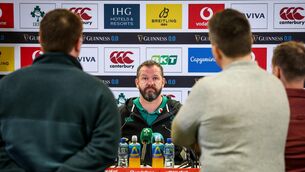Donal Lenihan: If Ireland can improve accuracy, history is still in their hands

Catching the best: All Blacks Brodie Retallick during team training in Dunedin this week.
The more nuanced and sophisticated rugby has become, the more it highlights the fact that the fundamentals of the game still revolve around a solid and productive set piece. You can have all the predetermined phase play mapped out in advance, designed to manipulate the defensive structure of the opposition like chess pieces on a board.










